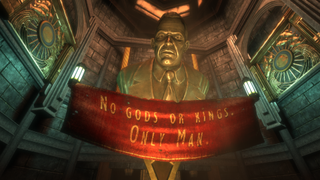The highs

Chris Livingston: Boss Plight
It's nice when you think something sucks and then you hear from the creator of the thing that, yeah, it does suck. I'm speaking of the original Bioshock's bossfight, which was a disappointingly standard videogame battle to end an otherwise highly novel and inventive game with. As Ken Levine recently admitted in an interview."It's terrible," he said. "You have this great game, and then you end up fighting this giant nude dude. We didn't have a better idea."
It's nice to hear such a frank admission. They probably should have checked with Tom Francis, who came up with a way better ending some years ago. By the way, if you're thinking about returning to Rapture, I took some comparison screenshots of the original games and the new remastered editions.
Samuel Roberts: Too old for this shit
One day I’ll be too old to play competitive games, and that’s fine. This study released last month charted how adults’ interest in playing games for the purposes of competition really trails off when people reach their mid-30s. When I jump into Rocket League and see the other team freestyling shots into the net from impossible angles, I yearn for the day when every multiplayer game has a matchmaking option for people with full-time jobs (you need to provide your three most recent payslips to the developer/publisher to be allowed in). Also, when I see a toddler spamming chat with ‘noob’ now, it somehow seems far more irritating than it did when I was in my early 20s. The sport then becomes demolishing a child’s self-esteem, which is actually fine.
It’s an interesting study, and it provoked a variety of reactions in that story’s comments thread. My reasons for playing games have always been pretty much the same—I like stories and a bit of a journey, to be honest. I like games to end. Science (or maths perhaps) tells me that’s likely to only grow over time.
James Davenport: Family comes seventh
The biggest gaming news, reviews and hardware deals
Keep up to date with the most important stories and the best deals, as picked by the PC Gamer team.
A new trailer for Resident Evil 7 dropped this week and it focuses on The Bakers, a bizarre cannibalistic family featured in the first person sequel. When I heard RE7 ditching the over-the-shoulder third person shooting for the PC’s favorite perspective, I was a bit skeptical. The demo played well enough and indicates that hopping between the present time and VHS memories could make for some interesting puzzles, but it didn’t feel like Resident Evil. It was too serious, a horror game clearly going for what Amnesia nailed years ago. But the new trailer has exactly what I wanted: laughs.
The Baker family seem like a pretty funny bunch, portrayed as so grotesque and dysfunctional that it comes off as campy and comedic. As spooky as exploring their house in first person might prove, I’m happy to know I’ll be tortured by characters, not faceless zombies. I hope so, at least. A focused, funny return to the cheeseball horror of Resident Evil could be exactly what the series needs.
Tim Clark: Cat power
Given his slight reputation for grumpiness, I was slightly apprehensive before interviewing Kripp this week, but ended up having a great time chatting to him about card balance and the long term challenges facing Hearthstone. It was especially interesting hearing him suggest that the problem with competitive play is Blizzard’s refusal to rebalance problematic cards in Constructed and the lack of invites for popular streamers. His position was lent weight later this week by the success of Firebat’s invite-only Batstone tournament, which saw a number of cards banned by community vote and the players themselves. It was a ton of fun, and the viewers responded in droves with concurrents on Twitch hovering between 30-40k throughout.
I do have some sympathy with Blizzard here though. The reason invites were phased out in the first place was because the scene became too much of an old boy’s network that was almost impossible to break into for outsiders. Ultimately a balance needs to be struck between fun tournaments and the more serious Championship Tour circuit, so I hope 2017 sees some radical restructuring. Meanwhile, I’m still spending more of my time in The Elder Scrolls: Legends open beta. I hit legend rank again this month, for once using a deck I brewed myself rather than lifted from the internet. You can check out the list here. If in doubt, it is always correct to send your cats flying into the other guy’s face.

Jarred Walton: Road Warrior
MSI’s GT83VR gaming notebook is planetoid sized. I’m surprised it doesn’t have its own weather system! Calling this a “notebook” is a bit like calling an 18-wheeler an SUV. Check out the specs on this behemoth: i7-6920HQ, GTX 1080 SLI, 2x512GB M.2 PCIe SSDs, and 64GB RAM. Powering all of this is not one but two 330W adapters, which combine via a box that hooks up to the back of the notebook.
This is obviously not the sort of thing you want to lug around much, but if you need a transportable gaming monster, it’s about as good as it gets. We’ve talked about desktop replacement notebooks in the past, but there were always compromises, particularly in the graphics department. Testing is underway, and it looks like the GT83VR will break every notebook performance record. It’s within 10 percent of a desktop running 1080 SLI, at least when a game can use it.
There are a few deterrents, however. Besides the astronomical price ($5000 for this particular model), the display is only a 1920x1080 60Hz panel. MSI bills this as a notebook built for VR, which I’m sure it can handle, though the size means that in practice it will still function like a desktop. The fans are also noisy when gaming, and it weighs over thirteen pounds—and that’s not counting the two power bricks that weigh around three pounds each! But if I had a sherpa to carry the backpack and a portable generator, I’d totally want this.
Tom Senior: short and sweet
I still love a good 100-hour RPG, but I’m increasingly fond of games that I can beat in one or two sittings. Good short games condense all of their best ideas into a smaller stretch that can be just as interesting and memorable as a sprawling big-budget epic. Gone Home’s mansion still feels like an authentic lived-in space to me, because I didn’t spend enough time there to start seeing through the cracks. Her Story delivers a twisting mystery in an hour or two, and doesn’t go on too long for its simple database-searching mechanic to wear thin. Some games work perfectly as a quick-fire experience.
Digital distribution has made it easier for developers to move cheaper games at lower prices, but it’s also taken a while for us to get used to shorter experiences, whether they’re framed as episodes or standalone minibites. Either way, we got our heads together this week to celebrate our favourites. If you’re looking for something satisfying and brief, hopefully there’s something here for you.
The collective PC Gamer editorial team worked together to write this article. PC Gamer is the global authority on PC games—starting in 1993 with the magazine, and then in 2010 with this website you're currently reading. We have writers across the US, UK and Australia, who you can read about here.
Most Popular

